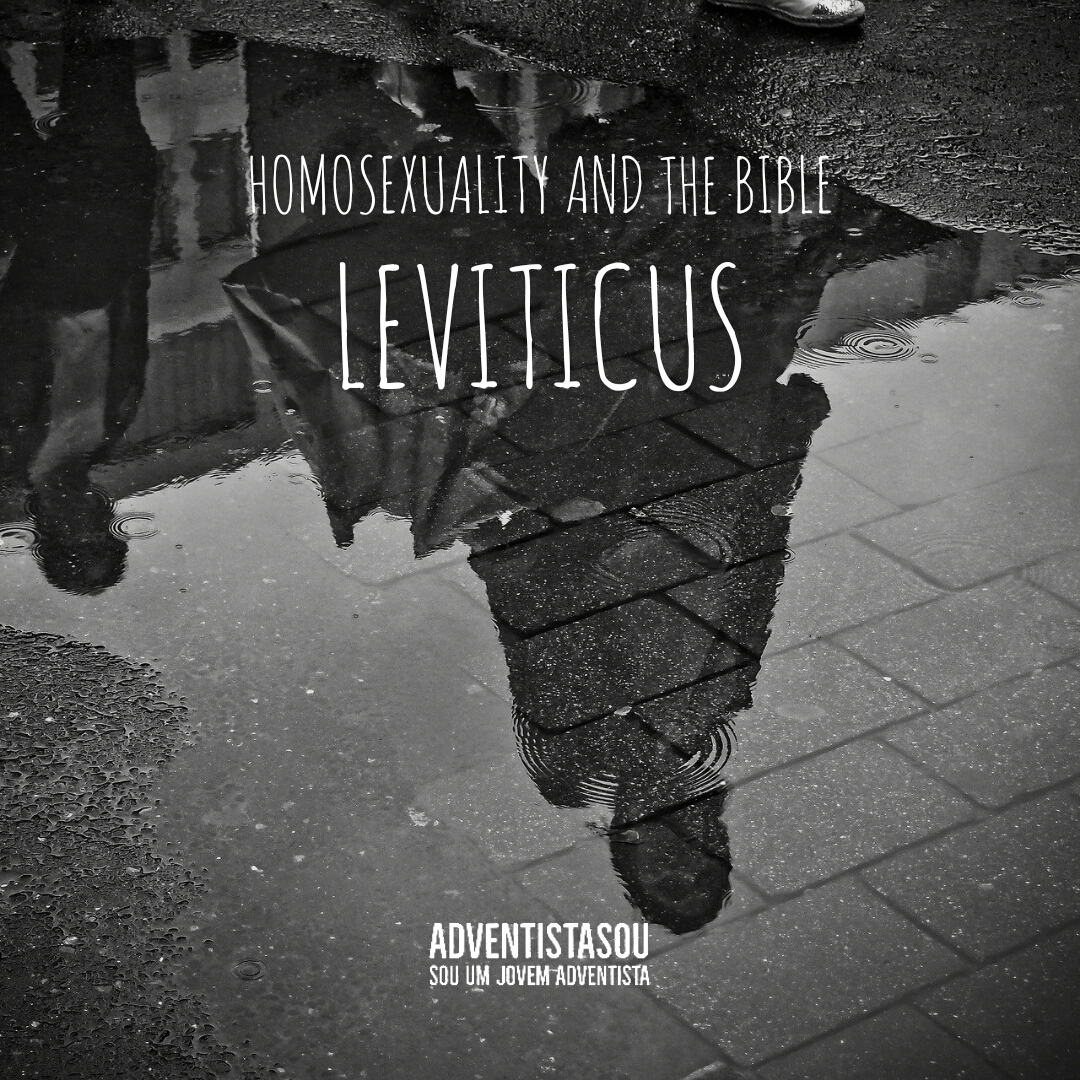HOMOSEXUALITY AND THE BIBLE #03: LEVITICUS
by Adventista Subversivo
Another text widely used to condemn homosexuals is Leviticus 18:22 and 20.13:
“You shall not lie with a male as with a woman; it is an abomination.” (18:22)
“If a man lies with a male as with a woman, both of them have committed an abomination; they shall surely be put to death; their blood is upon them.” (20:13)
There are several points to consider about these verses, among them: if there is a condemnation of "homo-affection", why was sex between women not mentioned? Why don't traditional Christian churches advocate death for homosexuals? The text is quite clear in imposing death on those men who performed "homogenital" acts (20:13).
They do not do so because they interpret some texts selectively, using isolated verses and excerpts, violating the contextualization rule. In the texts in question, the non-compliance with the laws of Exegesis by most Christians is indisputable, since they disregard a large part of the commandments contained therein, such as, for example, the prohibition on eating fat (7:23), seafood (11:12) or to wear clothes of different fabrics (19:19). It is very easy to defend a dogma considering only an isolated part of a text.
The text says, literally, "not lie with a male as with a woman". It is clear from the way the original text was written, both in 18:22 and 20:13, that, although sin is committed by two people, such condemnation is centered on the passive role of the "homogenital" relationship. Such a role was synonymous with submission and outrage to any man, as it made him similar to a woman. This was how the cultural prostitutes of pagan temples submitted to the sexual relations of their rituals. Israel was called to have supremacy over other peoples (Deuteronomy 28:1-13). Any act that meant subservience or humiliation would not be tolerated. Let us look at some important points of the text in question:
3) “You shall not do as they do in the land of Egypt, where you lived, and you shall not do as they do in the land of Canaan, to which I am bringing you. You shall not walk in their statutes.
21) You shall not give any of your children to offer them to Molech, and so profane the name of your God: I am the LORD.
22) You shall not lie with a male as with a woman; it is an abomination.
23) And you shall not lie with any animal and so make yourself unclean with it, neither shall any woman give herself to an animal to lie with it: it is perversion.
24) Do not make yourselves unclean by any of these things, for by all these the nations I am driving out before you have become unclean.
27) For all these abominations did the men of this land, who were in it before you; and the land was contaminated.
29) But whoever does any of these abominations, yes, those who do will be cut off from their people.” (Leviticus 18)
The biblical text (v.1) refers to all these acts as Canaanite practices and customs, indicating something that goes beyond sporadic conduct, of a small portion of the community, such as "homo-affective" relationships. According to the surveys, homosexuals are estimated at between 5% and 10% of the population and only a portion of this percentage is in a stable monogamous situation. The practices reported in Leviticus 18 were customary in those peoples and some of them were associated with religious rites. Some expressions in the text under study reveal that all these practices were part of the daily lives of the Canaanite peoples, they were not isolated conducts, but something generalized as indicated by the sentence “the land was contaminated” (v.27).
It is interesting to note that the list of sexual prohibitions changes dramatically when verse 21 introduces a ban on idolatrous practices, in this case, devotion to the god Molech, a deity known for his licentious rites and child sacrifice. Then there are the prohibitions on "homogenital" acts between men and sexual practices with animals.
In chapters 18 and 20, references are made to the sexual practices of the Canaanites as “laws or statutes” of those nations (18:30; 20:22 and 23), which confirms the strong connection of these customs with local culture, divinities and rituals. Jehovah ordered Israel to follow its laws and statutes, not the laws and statutes of the pagan gods. We realize from reading Leviticus 18:21-24, that God wants to preserve Israel from the idolatrous sexual practices of the foreign peoples that were in the land of Canaan:
"Therefore shall ye keep mine ordinance, that ye commit not any one of these abominable customs, which were committed before you, and that ye defile not yourselves therein: I am the Lord your God." (18:30)
“Ye shall therefore keep all my statutes, and all my judgments, and do them: that the land, whither I bring you to dwell therein, spue you not out. And ye shall not walk in the manners of the nation, which I cast out before you: for they committed all these things, and therefore I abhorred them.” (20:23-23)
In Deuteronomy 23:17-18, we find a clear allusion to this type of ritual:
“No Israelite man or woman is to become a shrine prostitute. You must not bring the earnings of a female prostitute or of a male prostitute into the house of the Lord your God to pay any vow, because the Lord your God detests them both."
The Canaanite religions emphasized the reproductive capacity of the land, crops and everything related to fertility, since those people were essentially agricultural.
This emphasis explains the importance of sexual intercourse in their ceremonies. Their cults included rites, very common in those religions, such as sacred or cultural prostitution, rituals in honor of fertility, celebrated with orgiastic practices, mainly in devotion to the gods Molech, Milcom, Astarote and Baal. Archaeological excavations revealed that their temples were centers of orgiastic addictions, with priests acting as homosexual prostitutes and priestess prostitutes.
Conclusion:
Sex in our culture is not an element linked to religious rituals, except in very specific circumstances. No form of sex today, whether homosexual or heterosexual, has a cultural or religious connotation prohibited in Leviticus. Thus, such a code becomes irrelevant to direct or prescribe "heteronormative" conduct.
In the next study, we will talk about Jesus Christ in relation to sexuality.
The peace of Christ.
Another text widely used to condemn homosexuals is Leviticus 18:22 and 20.13:
“You shall not lie with a male as with a woman; it is an abomination.” (18:22)
“If a man lies with a male as with a woman, both of them have committed an abomination; they shall surely be put to death; their blood is upon them.” (20:13)
There are several points to consider about these verses, among them: if there is a condemnation of "homo-affection", why was sex between women not mentioned? Why don't traditional Christian churches advocate death for homosexuals? The text is quite clear in imposing death on those men who performed "homogenital" acts (20:13).
They do not do so because they interpret some texts selectively, using isolated verses and excerpts, violating the contextualization rule. In the texts in question, the non-compliance with the laws of Exegesis by most Christians is indisputable, since they disregard a large part of the commandments contained therein, such as, for example, the prohibition on eating fat (7:23), seafood (11:12) or to wear clothes of different fabrics (19:19). It is very easy to defend a dogma considering only an isolated part of a text.
The text says, literally, "not lie with a male as with a woman". It is clear from the way the original text was written, both in 18:22 and 20:13, that, although sin is committed by two people, such condemnation is centered on the passive role of the "homogenital" relationship. Such a role was synonymous with submission and outrage to any man, as it made him similar to a woman. This was how the cultural prostitutes of pagan temples submitted to the sexual relations of their rituals. Israel was called to have supremacy over other peoples (Deuteronomy 28:1-13). Any act that meant subservience or humiliation would not be tolerated. Let us look at some important points of the text in question:
3) “You shall not do as they do in the land of Egypt, where you lived, and you shall not do as they do in the land of Canaan, to which I am bringing you. You shall not walk in their statutes.
21) You shall not give any of your children to offer them to Molech, and so profane the name of your God: I am the LORD.
22) You shall not lie with a male as with a woman; it is an abomination.
23) And you shall not lie with any animal and so make yourself unclean with it, neither shall any woman give herself to an animal to lie with it: it is perversion.
24) Do not make yourselves unclean by any of these things, for by all these the nations I am driving out before you have become unclean.
27) For all these abominations did the men of this land, who were in it before you; and the land was contaminated.
29) But whoever does any of these abominations, yes, those who do will be cut off from their people.” (Leviticus 18)
The biblical text (v.1) refers to all these acts as Canaanite practices and customs, indicating something that goes beyond sporadic conduct, of a small portion of the community, such as "homo-affective" relationships. According to the surveys, homosexuals are estimated at between 5% and 10% of the population and only a portion of this percentage is in a stable monogamous situation. The practices reported in Leviticus 18 were customary in those peoples and some of them were associated with religious rites. Some expressions in the text under study reveal that all these practices were part of the daily lives of the Canaanite peoples, they were not isolated conducts, but something generalized as indicated by the sentence “the land was contaminated” (v.27).
It is interesting to note that the list of sexual prohibitions changes dramatically when verse 21 introduces a ban on idolatrous practices, in this case, devotion to the god Molech, a deity known for his licentious rites and child sacrifice. Then there are the prohibitions on "homogenital" acts between men and sexual practices with animals.
In chapters 18 and 20, references are made to the sexual practices of the Canaanites as “laws or statutes” of those nations (18:30; 20:22 and 23), which confirms the strong connection of these customs with local culture, divinities and rituals. Jehovah ordered Israel to follow its laws and statutes, not the laws and statutes of the pagan gods. We realize from reading Leviticus 18:21-24, that God wants to preserve Israel from the idolatrous sexual practices of the foreign peoples that were in the land of Canaan:
"Therefore shall ye keep mine ordinance, that ye commit not any one of these abominable customs, which were committed before you, and that ye defile not yourselves therein: I am the Lord your God." (18:30)
“Ye shall therefore keep all my statutes, and all my judgments, and do them: that the land, whither I bring you to dwell therein, spue you not out. And ye shall not walk in the manners of the nation, which I cast out before you: for they committed all these things, and therefore I abhorred them.” (20:23-23)
In Deuteronomy 23:17-18, we find a clear allusion to this type of ritual:
“No Israelite man or woman is to become a shrine prostitute. You must not bring the earnings of a female prostitute or of a male prostitute into the house of the Lord your God to pay any vow, because the Lord your God detests them both."
The Canaanite religions emphasized the reproductive capacity of the land, crops and everything related to fertility, since those people were essentially agricultural.
This emphasis explains the importance of sexual intercourse in their ceremonies. Their cults included rites, very common in those religions, such as sacred or cultural prostitution, rituals in honor of fertility, celebrated with orgiastic practices, mainly in devotion to the gods Molech, Milcom, Astarote and Baal. Archaeological excavations revealed that their temples were centers of orgiastic addictions, with priests acting as homosexual prostitutes and priestess prostitutes.
Conclusion:
Sex in our culture is not an element linked to religious rituals, except in very specific circumstances. No form of sex today, whether homosexual or heterosexual, has a cultural or religious connotation prohibited in Leviticus. Thus, such a code becomes irrelevant to direct or prescribe "heteronormative" conduct.
In the next study, we will talk about Jesus Christ in relation to sexuality.
The peace of Christ.






Comentários
Postar um comentário
Diga-nos o que achou das publicações e dê-nos sugestões de novos posts. Gratidão e curta nossa página no Facebook: https://www.facebook.com/SouUmJovemAdventista